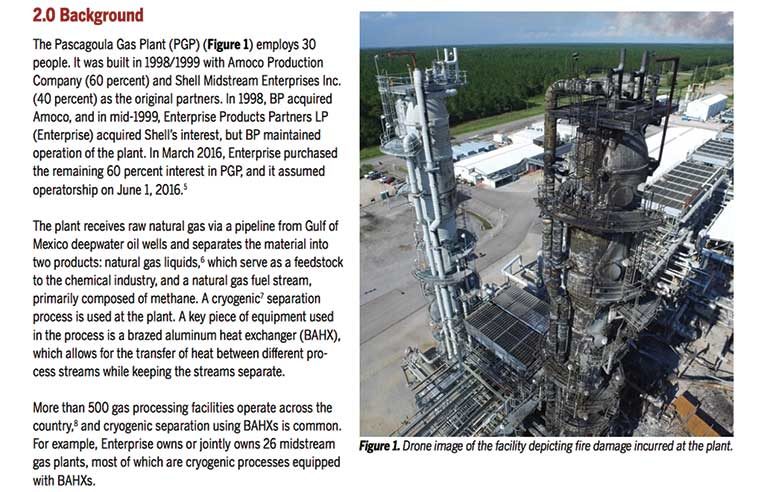CSB calls for inspections of heat exchangers in report on Mississippi gas plant explosion

Washington — Extending the life cycle of heat exchangers at the more than 500 gas processing facilities across the country “requires more robust inspection protocols,” the Chemical Safety Board has concluded after its investigation of a July 2016 series of explosions and fires at a plant in Pascagoula, MS.
In a final report issued Feb. 13, CSB states that gaps in safety management at the Enterprise Products Pascagoula Gas Plant allowed for thermal fatigue – the gradual weakening of a material from heating and cooling over time – on a brazed aluminum heat exchanger. Small cracks that had developed from repeated temperature fluctuation caused methane, ethane, propane and other hydrocarbons to leak from the exchanger, resulting in the explosions and fires. No workers were injured or killed in the incident.
CSB further identified the “absence of a reliable process to ensure the mechanical integrity of the heat exchanger.” The plant – which had repaired four heat exchangers nine times in 17 years, CSB found – was shut down for nearly six months.
“Operators shouldn’t take the risk of waiting to find a leak because, as this case demonstrates, that leak could result in a catastrophic failure,” CSB interim Executive Authority Kristen Kulinowski said in a press release.
CSB made several recommendations to two trade associations.
To the American Petroleum Institute:
- Develop an informational bulletin that highlights the safe operation, maintenance and repair of brazed aluminum heat exchangers. At a minimum, the resource should focus on the placement of temperature and pressure sensors on heat exchangers, venting protocol, and the potential for both minor leaks and catastrophic failure to result from accumulated thermal fatigue.
To the GPA Midstream Association:
- Revise its technical bulletin, or develop a new bulletin, to incorporate lessons learned from the Pascagoula incident.
- Develop a database for operators to submit operational heat exchanger data to foster collaborative industry learning and analysis.
- Continue data analysis to determine whether a correlation exists between operational process data and the frequency or timing of thermal fatigue-generated cracking to estimate the service life of a heat exchanger.
CSB also released an interactive, 3D model detailing the function of the heat exchanger at the Enterprise plant and the effects of thermal fatigue.
Post a comment to this article
Safety+Health welcomes comments that promote respectful dialogue. Please stay on topic. Comments that contain personal attacks, profanity or abusive language – or those aggressively promoting products or services – will be removed. We reserve the right to determine which comments violate our comment policy. (Anonymous comments are welcome; merely skip the “name” field in the comment box. An email address is required but will not be included with your comment.)

